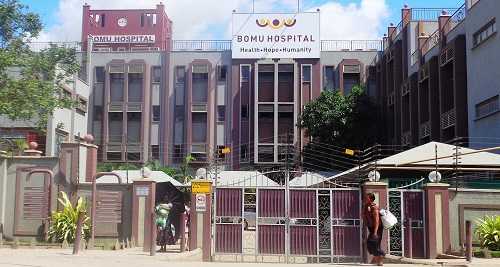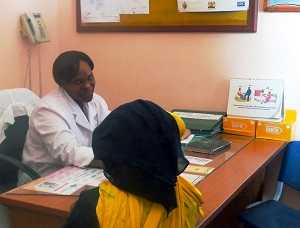Beginning Life Anew: An HIV Free Child

Bomu Hospital in Mombasa, Kenya, provides HIV prevention, care and treatment services with support of PEPFAR. (Photo Credit: Courtesy of Bomu Hospital)
In “January 2013, we were blessed with a healthy baby boy…”
For all couples, the prospect of bringing a child into the world brings joy and excitement as well as concern about their future child’s health. But for couples in which one or both partners are living with HIV, health concerns make the decision to conceive a child a difficult one.
In Kenya’s coastal city of Mombasa, a husband and wife expressed their thanks to Bomu Hospital for the care their family received before, during, and after the birth of their son. Bomu Hospital is supported by the Mkomani Clinic Society (MCS), a local implementing partner of the U.S. President’s Emergency Plan for AIDS Relief (PEPFAR).
In an anonymous letter, the couple described their relationship with the hospital. “Both I and my wife have attended [the Comprehensive Care Clinic] at Bomu Hospital for years. In 2012 we decided to try for a child. Your reputable hospital kept her advised on best practices as well as provided the needed [antiretroviral] drugs.”
In Kenya, the government has committed to work toward elimination of mother-to-child transmission of HIV, a key PEPFAR strategy. As one of the U.S. government agencies supporting PEPFAR, CDC collaborates with Kenya’s Ministry of Health to develop expert guidance and then work with partners like MCS to implement the guidance and develop high quality HIV prevention, care, and treatment services in its health facilities.

PEPFAR’s support for HIV care and treatment has been vital to the success of programs like the one at Bomu Hospital to provide for the health of those living with HIV, and also to ensure that those affected by HIV can have a long life with dignity and the same joys everyone hopes to experience, including a starting a family.
Eliminating the child’s risk of HIV infection continues after birth. The couple notes that their son “was immediately put on pediatric ARVs (antiretroviral drugs). Furthermore, the cost was catered for by the program. They followed up on his development each month during the regular clinical visits. His subsequent HIV tests were negative, thanks to the follow up and advice by your reputable and competent medical staff.”
Children born to mothers with HIV must continue to be monitored to confirm that they remain HIV free, particularly during breastfeeding. In Kenya, exclusive breastfeeding for the first six months of life is recommended with ongoing monitoring of the child’s HIV status for an additional year.
In “Aug[ust] 2014, the boy reached 18 months, and they did the last HIV test. We were overjoyed beyond words when he was finally declared HIV FREE and his file closed. For us parents, it felt like beginning life anew and being given a second chance to start life afresh.”
By focusing on best practices and concentrating efforts in areas which will most greatly impact the epidemic by preventing new infections and providing treatment to those affected, PEPFAR, CDC, and its partners can hope to achieve an AIDS-Free Generation.
As the couple concludes: “We today bear witness that efforts by Bomu Hospital and all her donors and supporters, who contribute in any way, big or small, towards support for treatment for HIV positive persons and ‘prevention from mother-to-child transmission programs’ …that their efforts towards a HIV FREE society [are] very much on track and [are] achievable, and that we are a living example of its success.”
Through PEPFAR support, Mkomani Clinic Society provides comprehensive HIV care and support services including adult and pediatric HIV care and treatment; HIV testing and counseling; partner and family member testing; antenatal care and PMTCT; nutrition services; positive health, dignity, and prevention services; and tuberculosis screening and treatment. Mkomani’s community-based services include economic empowerment and income generating activities, gender-based violence support programs, and services to orphans and vulnerable children in the Coast region of Kenya.
- Page last reviewed: December 30, 2014
- Page last updated: December 30, 2014
- Content source:
Global Health
Notice: Linking to a non-federal site does not constitute an endorsement by HHS, CDC or any of its employees of the sponsors or the information and products presented on the site.


 ShareCompartir
ShareCompartir